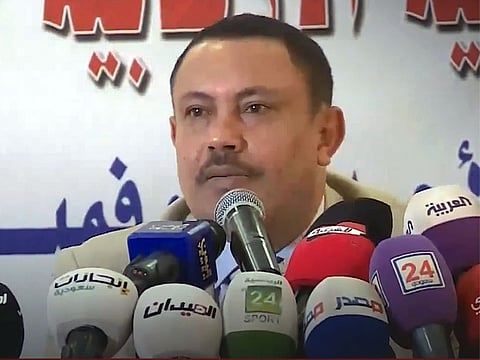Houthi minister from Yemen defects to Saudi-led Arab Coalition
Top Al Houthi government official flees Yemen, defects to Saudi Arabia

HIGHLIGHTS
- Top Al Houthi information official, Abdul Salam Ali Jaber, arrived in Saudi Arabia with his family
- They fled Sana’a, the Yemeni capital, which has been under rebel control since 2014.
- The Arab coalition, led by Saudi Arabia, has been fighting Iran-allied Al Houthi militants in Yemen since 2015
- Coalition's move was in response to a request from the country’s internationally-recognised government
Dubai: Abdul Salam Ali Jaber, the Al Houthi information minister who defected to the Saudi-led Arab Coalition, said his previous actions were made under duress: “We were forced to work with the coup-led government.”
Jaber arrived in Saudi Arabia with his family after they fled Sana’a, the Yemeni capital, which has been under rebel control since 2014.
Ali Jaber is the most senior member of Al Houthi administration to defect. He admitted being a member of the team involved in a “misleading information campaign” by rebels, saying he acted under duress.
Al Jaber started by pointing out: "I want to put forward a set of points that might clarify the situation within the areas controlled by Al Houthis."
"Since September 2014, Yemen has been subjected to a brutal state of repression and the takeover of its institutions. The people of Yemen have been subjected to that brutal hegemony.
They have divided Yemen into zones of conflicts, and have spread chaos into its institutions...Al Houthi leaders within are in conflict with each other.Abdul Salam Ali Jaber, Houthi ex-information minister, who defected to coalition
He added: "What is happening in Yemen is more dangerous than just a coup."
Al Jaber said: “The Yemeni people reject the domination of the rebels and are waiting for the opportunity to get rid of them. Yemenis refuse the Houthi project and the domination of Iran or any other state.”
Al Jaber, who held a press conference in Riyadh, said also that Al Houthis are witnessing their last days.
“They have divided Yemen into zones of conflicts, and have spread chaos into its institutions.” He added: "Al Houthi leaders are in conflict with each other."
“What is happening in their areas mirrors militia practices, and makes the liberation of Yemen a faster process.”
He added: “Prisoners are tortured by the rebels.” “The militias send children to war in the name of religion. There are thousands of journalists, whom we could not help.”
The Arab coalition, led by Saudi Arabia, has been fighting Iran-allied Al Houthi militants in Yemen since 2015 in response to a request from the country’s internationally recognised government.
Halt US refuelling of coalition jets
Meanwhile, the United States has welcomed the Arab coalition's decision to refuel its aircraft in Yemen using its own assets.
“We support the decision by the Kingdom of Saudi Arabia, after consultations with the US government, to use the coalition’s own military capabilities to conduct in-flight refuelling in support of its operations in Yemen,” US Defence Secretary Jim Mattis said, according to AP.
The Arab coalition fighting in Yemen said Saturday it had requested the US to stop refuelling its jets in the war-torn country, citing its capability to do the job.
The alliance, led by Saudi Arabia and the United Arab Emirates, added in a statement that the coalition’s member-countries have recently enhanced their own aircraft refuelling in Yemen.
“In view of this and in consultation with allies in the US, the coalition has requested the American side to halt air refuelling of its planes in the current operations in Yemen,” the alliance added in the statement carried by the official Saudi news agency SPA.
Saudi Arabia and the UAE have 21 and six in-flight refuelling aircraft respectively in Yemen, Dubai-based television Al Arabiya reported.
Strategic
Meanwhile on Sunday, government military experts defused dozens of explosives planted by Al Houthis around the hospital to hamper the coalition-backed forces, the army said.
Also Read: US could name Al Houthis a terrorist group
Also Read: Hadi swears in Yemen’s new PM prime minister
Also Read: Yemen troops surround Hodeida city
The coalition-supported forces are pushing into the heart of the Red Sea city.
Hodeida is strategically important because of its port through which most Yemen’s humanitarian aid and imports enter.
The government and Arab coalition accuse Al Houthis of taking advantage of their control of the Hodeida port to obtain weapons from their Iranian patrons as well as confiscate aid intended for Yemenis in order to sustain their war efforts.
The fight in Hodeida comes amid increasing international calls for Yemen’s warring sides to end the conflict of more than three years. The US has urged the combatants to observe a ceasefire by the end of this month.
The government has announced readiness for peacemaking, while Al Houthis have demanded the US to stop support for the Arab coalition.
Sign up for the Daily Briefing
Get the latest news and updates straight to your inbox



